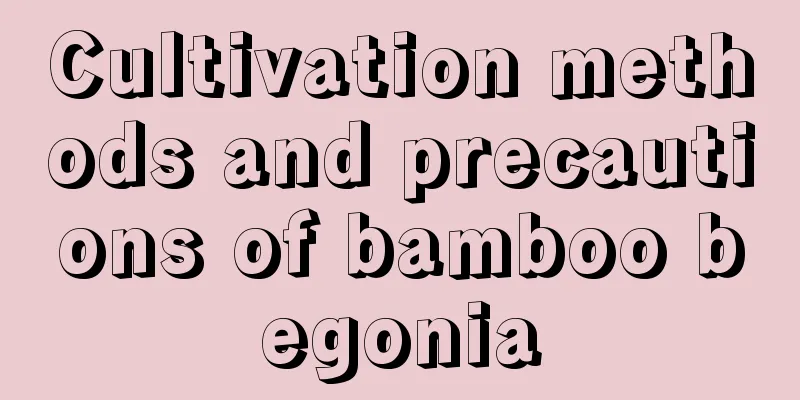Cultivation methods and precautions of bamboo begonia

Farming methodsLight and temperatureBamboo Begonia prefers a semi-shady growing environment and requires a mild climate. It is best to have sufficient diffuse light, but be careful not to have too strong light, otherwise it will cause the leaf tips to dry and turn yellow. In spring, autumn and winter, it can be given sufficient light, and in the summer when the sun is strong, it can be placed in a cool and ventilated place with bright scattered light. Be careful not to shade it too much, which will affect the growth of the plant. The best growth temperature is between 15℃ and 25℃. It is not cold-resistant and the temperature in winter should be kept above 10℃. > Watering and fertilizingBamboo Begonia likes a humid environment and can tolerate drought, but is afraid of waterlogging. Water it when the soil is dry and keep it moist. Be careful not to have water accumulation in the pot. When the weather is hot, water more often and spray water to increase air humidity and reduce temperatures. When applying fertilizer, be careful not to apply too much fertilizer. During the peak growth period, it is sufficient to apply a thin liquid fertilizer once every half a month. During the bud-forming period, some phosphorus and potassium fertilizers can be applied to make the flowers bloom beautifully. During the flowering period, it is necessary to reduce and stop fertilizing. In winter, when the growth slows down, fertilization should also be stopped. ReproductionThe main methods of reproduction of bamboo begonia are sowing and cuttings. Seed propagation can be done in spring or autumn, and cuttings propagation can be done by leaf cuttings, stem cuttings or rhizome cuttings. PrecautionspruneDuring the cultivation process, bamboo begonias need to be pruned in order to maintain a good shape and ensure the ornamental effect. Pruning can be combined with repotting, which is conducive to the sprouting of new branches and more flowering. Pests and diseasesCommon diseases of bamboo begonia include leaf spot, gray mold, root rot and wilt, which need to be treated according to the specific symptoms. The pests are mainly scale insects, which can be captured manually or killed by spraying pesticides. |
<<: Breeding methods and precautions of Jade
>>: Cultivation methods and precautions of Oxytricha
Recommend
How to repot African violets
African violet pot selection To repot the African...
When do orchids bloom? (Orchid flowering period)
1. When does orchid bloom? There are many varieti...
6 tips to make succulents bloom
More and more friends like succulents, because su...
Cucumber planting time and method
Cucumber planting time The best time to plant cuc...
How to change the color of the leaves of the Jade Plant (How to change the color of the Jade Plant to red)
The ones with color-changing leaves are variegate...
How to water the small fortune tree
Tips for watering the small fortune tree The smal...
How to propagate the succulent Huangli
Leaf cuttings Leaf cuttings are the simplest meth...
Can you grow succulents on loess?
Can succulents be grown on loess? Succulents can ...
How to grow cat's claw
1. Soil: Cat's claw can survive in most soils...
Why are the leaves of the fortune tree turning yellow?
Reason 1: Improper watering The money tree likes ...
How to grow egg yolk fruit in a pot
Potting method Variety selection The varieties ge...
When and how to change the soil of Ficus microcarpa
Time to change the soil of fiddle-leaf fig The fi...
When is the best time to repot Anthurium? Repotting methods and precautions
Anthurium repotting time Anthurium needs to be re...
How to fertilize Tiger Pilan
Time of fertilization When planting Sansevieria, ...









